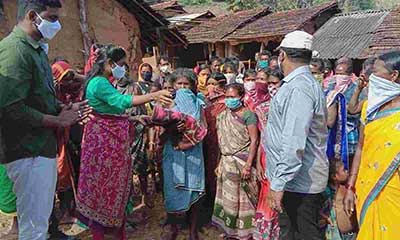Date: 02/12/2022
Relevance: GS-2: Government policies and interventions for development in various sectors and issues arising out of their design and implementation.
Key Phrases: Merit Goods, Non-Merit Goods, Navaratnalu Scheme, Land Reforms, Nationalisation Of Banks, Midday Meal Scheme, Fee Reimbursement Scheme.
Context:
- The Reserve Bank of India’s report, State Finances: A Risk Analysis, has led to a debate on welfare measures.
- It is being argued that schemes addressing basic amenities are ‘merit goods’ and those such as loan waivers are ‘non-merit goods’.
Evolution of freebie and welfare scheme debate:
- The history of welfare schemes shows that nearly every good was dismissed as non-merit when it was proposed for the first time.
- It has been alleged that public funds are squandered by the means of welfare schemes.
- However, many welfare measures have been introduced to improve standards of living such as:
- Land reforms: When land reforms were expedited in 1969, it was argued that hard-earned land must not be taken away for free. However, land distribution gave many landless families a sustainable livelihood and improved food production.
- Nationalisation of banks: In the same way, bank nationalisation was severely criticised as a populist measure but it made banking services accessible to the rural poor, farmers, and helped the expansion of small and medium-scale industries.
- Midday meal scheme: Although the scheme by Tamil Nadu government was opposed in the beginning, however, the scheme has now become an essential component of school education in several States.
Some exemplary welfare programmes by the Andhra Pradesh government:
- Navaratnalu (nine welfare and development schemes):
- The scheme was introduced to achieve the 17 Sustainable Development Goals, proposed by the UN, with a voluntary deadline of 2030 and without active and immediate interventions from governments, these goals are impossible to achieve.
- The purpose of Navaratnalu is to support families in areas such as education, healthcare, agriculture, pensions, and subsistence support.
- Between May 2019 and September 2022, the state government directly transferred ₹1.77 lakh crore to the beneficiaries of Navaratnalu.
- During the COVID-19 years, this assistance became the lifeline for most of the families.
- Amma Vodi scheme:
- Under the scheme, more than 83 lakh children receive an annual grant of ₹15,000 each for their schooling till Class 12.
- Today, no child in the State needs to drop out of school due to poverty and gender discrimination.
- Besides Amma Vodi, six other schemes fund education at the school and collegiate levels.
- These have several socio-economic benefits and women are the prime beneficiaries of most of the schemes and this women-centric approach has increased the decision-making capacity of women in many families.
- Fee reimbursement scheme:
- The scheme was launched to fund professional education for students from low-income backgrounds, and it made professional education accessible to students who otherwise could not afford it.
Should the funds spent on welfare schemes be instead used for infrastructure development and industrialisation?
- Due to its welfare spending, A.P. is being projected as a State encouraging a freebie culture.
- However, expenditure on welfare should be considered a long-term investment in human capital.
- The government strikes a balance between growth and social spending and works on both of them simultaneously.
- Despite its disadvantageous condition after State bifurcation and the pandemic, A.P. recorded the highest GSDP growth in India in 2021-22.
- It is due to this multifaceted effort that A.P. continues to top several human development index parameters and has become the top investment destination and ranks first in the Ease of Doing Business list.
- The emphasis on skilling, the provision of 75% local reservation in private jobs, the continuous support to MSME units, and an honest approach towards businesses have transformed the State into an investment hub.
- Data shows that the State’s welfare credentials have not diminished its investment appeal, rather enhanced it.
Freebies vs Welfare Measures:
- A Welfare measure is a public policy intervention that will have a long-term impact on production as well as productivity if it is limited to the economic and public policy perspective while any public policy intervention that doesn’t support medium-term to long-term production and productivity may be termed a freebie.
- It is necessary to distinguish freebies from public/merit goods which include expenditure that brings economic benefits such as the public distribution system, employment generation schemes, and state support for education and health.
- Provision for free electricity, free water, free public transportation waiver of pending utility bills, and farm loan waivers are regarded as freebies, which potentially undermine credit culture, distort prices, through cross-subsidization, and disincentivise work at the current wage rate leading to a drop in labour force participation.
Way Forward:
- By definition, in a welfare state, the government is responsible for the individual and social welfare of its citizens.
- A fundamental feature of the welfare state is social insurance and social security.
- Welfare encompasses those government programs that provide benefits and economic assistance to no or low-income people and improve the quality of life and living standards of the poor and underprivileged.
- Thus, the welfare programmes ensuring a broad flow of benefits and economic opportunities as well as encompassing empowerment and participation should not be termed as freebies.
- A distinction has to be made between the freebies and welfare programmes which has only a fine line between them.
- In place of freebies, a model of welfare provisioning and governance that provides balanced development without creating avoidable fiscal constraints, should be adopted and practiced.
Source: The Hindu
Mains Question:
Q. In place of freebies, a model of welfare provisioning and governance that provides balanced development without creating avoidable fiscal constraints, should be adopted and practiced. Justify the statement with the help of examples and case studies.(250 words).








